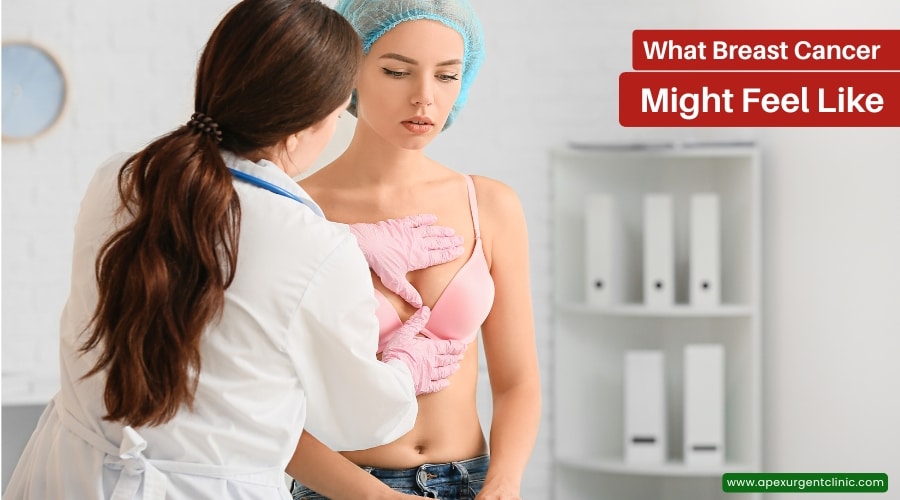
Hearing the words “breast cancer” can stir fear, but not every lump in your breast means cancer. Understanding what’s normal for your body can help ease the worry. Whether you are a teenager learning about breast health, a woman in your 30s, or a nursing mom, knowing what early signs to watch for and when to get checked makes the difference. At Apex Urgent Care Clinic, we guide you through every step, from education to evaluation, with care and compassion from our Houston doctor.
What Breast Cancer Might Feel Like

Breast cancer begins with a lump that feels different from the rest of your breast tissue. It is firm, painless, and doesn’t move under the skin. The tricky part—not every lump is cancerous. Some are caused by hormonal changes, cysts, or infections. That’s why it’s so important not to panic, but to get checked out when something doesn’t feel right.
In teenagers, breast cancer is rare. Most lumps in this age group are fibroadenomas, which are benign (non-cancerous) and often associated with hormonal changes during puberty. Still, learning how to perform a self-exam and understanding what’s normal for your body helps build lifelong awareness.
For nursing mothers, the breasts naturally feel full and tender. A blocked milk duct or mastitis (breast infection) can create a lump that mimics cancer, but these come with pain, redness, or warmth. A doctor can tell the difference.
Early Signs to Watch For
Beyond lumps, there are other early signs of breast cancer to keep an eye on:
- Changes in breast shape or size
- Dimpling or puckering of the skin
- Nipple discharge, especially bloody or clear fluid, not linked to breastfeeding.
- Redness or flaky skin on the breast or nipple
- A nipple that turns inward when it normally doesn’t
If you notice any of these changes, schedule a check-up at Apex Urgent Care Clinic. Our providers can evaluate your symptoms and guide you appropriately.
How to Overcome the Fear of Testing
Getting a breast exam can feel intimidating, and it is normal to feel nervous. Try to see it as an act of self-care rather than something to fear. At Apex, our team works to make the process simple, supportive, and comfortable for you.
During an initial test, the provider examines your breasts, asks about symptoms, and may recommend imaging like an ultrasound or mammogram, depending on your age and history. You will leave with answers and peace.
Other Breast Conditions Often Confused with Cancer
A clinical exam and imaging are the best ways to differentiate; do not self-diagnose. Non-cancerous conditions that cause breast changes similar to cancer include:
- Fibrocystic breast changes: Common in women of reproductive age; breasts may feel lumpy or tender, especially before your period.
- Cysts: Fluid-filled sacs that can come and go with hormonal shifts.
- Mastitis: A common infection in breastfeeding women, often with pain and swelling.
- Lipomas: Soft, fatty lumps under the skin that are harmless.
Understanding Hormonal Changes
It’s easy to confuse normal hormonal breast changes with warning signs. During your period, your breasts feel swollen or sore due to fluid retention and hormone fluctuations. Similarly, pregnancy comes tenderness and fullness making it hard to detect new lumps.
The best time to do a self-exam is a few days after your period ends, when the breasts are least tender. For pregnant or nursing mothers, monthly self-checks help you stay familiar with your baseline.
How to Do a Self-Exam
Make it a part of your monthly self-care routine. Here’s a simple routine you can follow:
- Look: Stand in front of a mirror with your shoulders straight and hands on your hips. Look for changes in size, shape, or skin texture.
- Feel (standing): Use the pads of your fingers to feel your breast in circular motions, moving from the outer edge toward the nipple.
- Feel (lying down): Place a pillow under your shoulder and repeat the same motion to check for lumps or thickened areas.
Takeaway
If you notice something different, get it checked. Seeing a doctor early helps you take control of your health. At Apex Urgent Care Clinic, our Houston doctor and team are here to support you with care, clear answers, and confidence.

